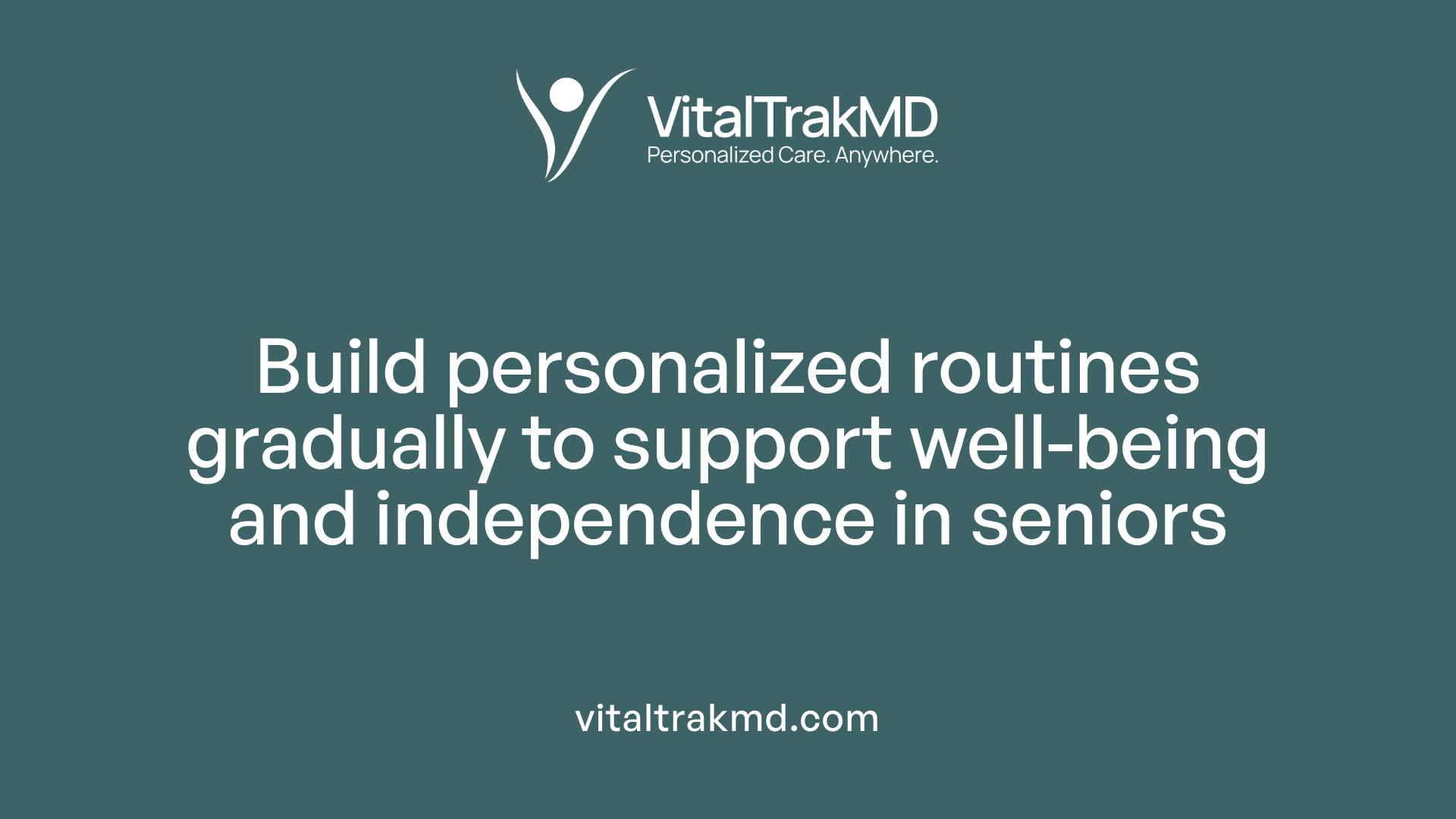Consistency’s Role in Maintaining Senior Wellness and Health

Understanding the Crucial Role of Consistency in Aging Gracefully
As the aging process unfolds, maintaining health and wellness can become increasingly complex. Research underscores the significance of establishing and adhering to consistent routines to support physical, emotional, and cognitive health in older adults. This article explores how consistent habits and familiar environments act as pillars of stability, fostering independence, reducing stress, and promoting a higher quality of life for seniors.
Scientific Foundations Supporting Routine in Senior Care

What scientific evidence supports the benefits of consistency in senior health management?
Research consistently demonstrates that maintaining routines in health care substantially improves outcomes for older adults. Regular schedules for meals, medication, sleep, and physical activity are linked to lower rates of hospitalization, reduced healthcare costs, and greater overall well-being. For example, studies show that seniors who follow structured routines tend to have better management of chronic conditions such as hypertension and diabetes, which are common among elderly populations.
Beyond physical health, psychological well-being is also enhanced through routine. A sense of purpose in life (PIL)—which can be fostered through daily activities and structured social participation—is associated with fewer chronic illnesses, reduced healthcare use, and higher levels of life satisfaction. Seniors with a strong sense of purpose often experience lower levels of depression and anxiety, supporting the idea that routines contribute to mental health.
Care models like the Age-Friendly Health Systems’ '4Ms' framework emphasize that routine is vital for effective care. The '4Ms'—What Matters, Mentation, Medication, and Mobility—are implemented through personalized, consistent care strategies. Electronic health records (EHR) help primary care providers and caregivers ensure continuity, enabling real-time monitoring and adjustment of care plans. This technological support fosters reliable care, minimizes errors, and promotes engagement with patients and their families.
Organized discharge procedures and active involvement of seniors and their loved ones further reinforce routine by ensuring that care plans are clear, adhered to, and adjusted as needed. These methods serve to preserve independence, reduce confusion, and prevent adverse health events.
In essence, scientific research advocates for a comprehensive approach combining evidence-based protocols, technological tools, and psychological support through routine. Such an integrated strategy not only promotes physical health but also nurtures emotional stability and cognitive engagement, leading to a higher quality of life.
| Aspect | Evidence | Additional Details |
|---|---|---|
| Physical health outcomes | Improved management of chronic diseases, reduced hospitalizations | Regular routines support medication adherence, nutrition, and mobility |
| Psychological benefits | Lower depression, increased purpose | Routine fosters predictability and emotional security |
| Care models | Age-Friendly '4Ms', electronic health records | Use of structured protocols and technology ensures consistency |
| Social and emotional stability | Reduced confusion, maintained dignity | Familiar routines, caregiver consistency, family involvement |
| Techniques and tools | Wearable trackers, organized discharge | Enhance adherence, monitor progress, promote real-time adjustments |
The overall body of scientific evidence affirms that maintaining consistent routines forms a cornerstone of effective and compassionate senior care. It holistically benefits physical health, mental resilience, and emotional well-being, reinforcing the importance of structured, person-centered approaches.
Strategies for Developing Effective Routines in Older Adults

What strategies can be used to implement routines that enhance senior well-being?
Implementing routines that support senior wellness involves establishing consistent daily schedules incorporating vital activities like meals, sleep, medication, and social interactions. Consistency provides emotional comfort and reduces confusion, especially for those with memory challenges or cognitive decline.
To start, caregivers and health professionals should create personalized plans that include both essential daily tasks and enjoyable activities such as hobbies, outdoor walks, or music therapy. These activities not only promote mental engagement but also physical health, helping seniors maintain independence.
Gradual introduction of routines is crucial. Starting with simple, achievable goals allows seniors to adapt comfortably. For example, setting regular wake-up and bedtimes, scheduled mealtimes, and designated times for physical activity creates predictable anchors in their day.
Supporting social engagement plays a vital role. Incorporating group activities or virtual social interactions fosters a sense of belonging and purpose. Community programs or family visits enhance emotional well-being and reduce feelings of isolation.
Caregivers should involve seniors in planning routines to ensure activities are meaningful and aligned with individual preferences. Incorporating mental stimulation through puzzles, storytelling, or listening to music contributes to cognitive health.
Role of caregivers and healthcare providers
Caregivers and healthcare professionals are instrumental in designing and maintaining these routines. Their role includes assessing individual needs, providing consistent support, and adjusting routines as circumstances change.
Familiarity and consistency in caregiving staff foster trust and emotional security, especially for residents with dementia or memory impairments. Continuity reduces confusion and agitation, promoting peace of mind.
Supervising medication schedules, reminding about hydration, ensuring proper nutrition, and encouraging physical activity are all essential tasks managed within routines. Healthcare providers can also incorporate clinical assessments and tailor activities to manage chronic conditions effectively.
Gradual build-up and personalization of routines
It is recommended to implement routines gradually, allowing seniors to adapt without feeling overwhelmed. Starting with core activities like regular meal times and bedtime routines creates a foundation.
Personalization is vital for success. Routines should reflect individual preferences, hobbies, and cultural backgrounds. For instance, some seniors may prefer gardening or reading, which can be included in their daily plans.
Flexibility is equally important. While consistency is beneficial, allowing some spontaneous activities or adjustments helps seniors feel a sense of control and spontaneity, fostering joy and engagement.
Monitoring, feedback, and routine adjustments
Ongoing monitoring and feedback are essential for sustaining effective routines. Caregivers should observe seniors’ responses and emotional states, noting any signs of stress, fatigue, or disinterest.
Routine adjustments based on this feedback ensure activities remain engaging and appropriate. For example, if a senior becomes tired earlier in the day, adapting schedule timings or reducing activity intensity can improve comfort.
Regular check-ins with healthcare professionals also help evaluate health outcomes related to routines, such as sleep quality, medication adherence, and physical health metrics. Using tools like health diaries or digital trackers can facilitate these observations.
In conclusion, creating adaptable, personalized routines supported by consistent caregiving and healthcare oversight can significantly enhance the physical, emotional, and mental well-being of older adults. Emphasizing gradual implementation, personalization, and continuous feedback ensures routines remain effective and joyful, empowering seniors to lead active and fulfilling lives.
How Routine Empowers Healthcare Management and Wellness Promotion

How does routine support healthcare management and promote wellness in seniors?
Establishing consistent daily routines is vital for the overall wellness of seniors. It offers a framework that helps seniors feel secure and in control, reducing feelings of stress and confusion that often accompany aging or health challenges.
Routine management incorporates scheduled activities such as regular meals, medication times, hydration checks, and physical exercises. This predictability ensures that seniors adhere to health regimens, which leads to better control of chronic conditions like hypertension, diabetes, and heart disease.
Additionally, routines assist in maintaining proper sleep patterns by establishing regular wake-up and bedtimes, which support circadian rhythm regulation and enhance sleep quality. Better sleep correlates with improved cognition, mood, and physical health.
For seniors with memory issues or cognitive decline, consistent routines serve as anchors that reduce agitation and disorientation. Familiar schedules for personal care, meals, and social engagement promote independence and emotional security.
Engagement in meaningful activities—such as gardening, storytelling, or listening to music—within routines keeps minds active and nurtures emotional health. These activities foster social interaction and provide a sense of purpose.
Personalized care plans designed in collaboration with healthcare professionals create routines tailored to the individual’s needs and preferences. Such customization ensures health goals are met while respecting personal dignity and promoting a sense of autonomy.
Incorporating structured routines benefits not only physical health but also mental well-being and emotional stability, forming a foundation for successful aging.
| Aspect | How Routine Supports | Additional Details |
|---|---|---|
| Medication adherence | Scheduled times improve compliance | Reduce missed doses and adverse events |
| Physical activity | Regular exercise routines improve strength and mobility | Activities like walking or stretching promote overall health |
| Sleep hygiene | Routine bedtime rituals enhance sleep quality | Avoid overstimulation and promote relaxation |
| Emotional health | Social and recreational activities foster connection | Reduce loneliness and provide emotional stability |
| Personalized care | Tailoring routines with healthcare providers benefits well-being | Addresses unique health needs and preferences |
Supporting medication adherence, enabling physical activity, maintaining sleep hygiene, and co-creating personalized routines with healthcare professionals are pillars of effective senior wellness strategies. They foster independence, support chronic disease management, and promote a balanced, fulfilling lifestyle.
How Predictable Routines Foster Independence and Improve Quality of Life

In what ways do predictable routines support independence and quality of life in older adults?
Establishing reliable daily routines is instrumental in helping older adults maintain their independence. Consistent schedules give seniors a sense of predictability, which reduces feelings of confusion and anxiety—particularly vital for those experiencing cognitive decline or dementia.
Structured routines encompass essential tasks such as personal grooming, medication management, meal preparation, and hydration checks. When these activities are embedded into daily life, seniors gain confidence in managing their wellbeing, leading to greater autonomy.
Moreover, routines that include physical activities like walking or stretching promote physical health. Engagement in social behaviors, such as regular calls or group activities, can enhance emotional well-being and combat loneliness.
Supporting daily task management
Clear, predictable routines simplify daily life, helping seniors remember important activities without feeling overwhelmed. For instance, setting specific times for meals, medications, and rest provides a framework that assists seniors in executing tasks independently.
Having a routine also encourages the development of good habits, such as timely medication intake and proper nutrition, which are crucial for managing chronic conditions and maintaining overall health.
Tailoring routines to individual needs
Recognizing that each senior has unique preferences, abilities, and health considerations is vital. Care plans by organizations like Homewatch CareGivers emphasize personalized routines that include wake-up and sleep schedules, hobbies, and social activities.
Flexibility within routines allows seniors to adapt activities based on their energy levels and interests, fostering a sense of control and satisfaction.
Encouraging active participation and decision-making
Involving seniors in planning their routines empowers them to make choices about their daily lives. This participation reinforces independence, boosts self-esteem, and helps sustain motivation.
Activities like choosing meals, selecting hobbies, or setting daily goals can stimulate mental engagement and promote a proactive attitude towards aging.
Overall benefits of routine for seniors
Consistent, personalized routines contribute significantly to physical health, emotional stability, and cognitive resilience. They support seniors in managing their health effectively while fostering a dignified, autonomous lifestyle.
By embedding meaningful activities and allowing flexibility, routines turn predictable schedules into tools for enriching life, encouraging participation, and sustaining independence.
| Aspect | Description | Additional Notes |
|---|---|---|
| Emotional Security | Familiar routines provide comfort, reducing stress | Essential for residents with dementia |
| Physical Health | Routine scheduling encourages exercise, medication adherence | Supports recovery and chronic disease management |
| Mental Engagement | Incorporating stimulating activities maintains cognitive functions | Includes puzzles, storytelling, music |
| Personalization | Routines tailored to individual preferences boost satisfaction | Promotes autonomy and joy |
| Support for Daily Tasks | Clear plans for essential activities promote independence | Reduces reliance on caregivers |
| Flexibility | Adapt routines to changing needs and energy levels | Maintains a sense of control |
Fostering a balance between structure and flexibility in daily routines empowers seniors, allowing them to live with dignity, engagement, and confidence.
Maintaining Familiar Environments and Relationships for Emotional Well-being

Why is maintaining familiar environments and relationships important for seniors' emotional well-being?
For seniors, especially those experiencing cognitive decline or living with chronic health conditions, familiar surroundings and trusted relationships serve as anchors in their daily lives. These elements are crucial because they create a sense of comfort and security, reducing feelings of confusion, anxiety, and stress.
A home environment filled with familiar objects, such as photographs, artwork, or personal belongings, can evoke memories and emotional stability. This sense of continuity helps seniors maintain their identity and eases the challenges associated with memory loss or health transitions.
Strong social connections are equally important. Engaging with family, friends, or caregivers provides emotional support, companionship, and opportunities for meaningful interaction. These relationships reinforce a sense of belonging, purpose, and self-worth, which are vital for mental health.
The positive impact of familiar environments and relationships extends beyond emotional comfort. They contribute to better physical health outcomes by encouraging seniors to participate in daily activities confidently and independently. Familiar routines enable seniors to manage their medication, nutrition, and physical activity more effectively.
Additionally, maintaining these connections helps reduce feelings of loneliness and depression, prevalent issues among older adults. Loneliness can lead to cognitive decline and increased health risks, but familiar surroundings and trusted relationships help mitigate these effects.
Supporting seniors in preserving their environments and relationships involves consistent caregiving, minimizing staff turnover, and fostering open communication with family members. Community programs can also facilitate social engagement and create opportunities for seniors to stay connected in meaningful ways.
Overall, the importance of familiar environments and relationships in senior well-being cannot be overstated. They serve as vital pillars that uphold emotional health, facilitate physical activity, and promote a sense of purpose, dignity, and belonging throughout the aging process.
| Aspect | Benefits | Implementation Strategies |
|---|---|---|
| Familiar Surroundings | Comfort, memory recall, emotional stability | Use personal belongings, decorate with familiar items, maintain consistent home settings |
| Strong Relationships | Emotional support, social engagement | Regular visits, social activities, family involvement |
| Reduced Anxiety & Confusion | Clarity in daily routines, decreased disorientation | Consistent schedules, familiar routines, familiar caregivers |
| Mental Health & Self-esteem | Sense of purpose and belonging | Encourage participation in hobbies, social groups, community events |
| Physical Health Support | Independence, activity encouragement | Include familiar physical activities, routine health checks |
In summary, maintaining familiar environments and relationships is fundamental to promoting emotional resilience and overall well-being in seniors. These elements foster stability, confidence, and a sense of being valued, which are essential for aging healthily and happily.
Fostering a Culture of Consistency in Senior Care
Implementing and maintaining consistent routines and familiar environments are vital for supporting aging individuals through physical health, emotional stability, and cognitive resilience. Caregivers, family members, and healthcare systems play pivotal roles in designing personalized schedules that reinforce trust, independence, and purpose. As evidence shows, consistency not only enhances health outcomes but also enriches seniors’ overall quality of life, making aging a period of dignity, stability, and fulfillment. Embracing this approach promises a more compassionate, effective, and holistic model of senior care that adapts to individual needs and promotes wellness at every stage of aging.
References
- The Power of Routine: Why Consistency Helps Seniors Thrive
- The Importance of Routine in Senior Wellness | Brentwood HCC
- The Importance of Consistent Routine and Stability for Seniors
- Why Are Consistent Routines So Helpful for Aging Seniors?
- Examining Physical Wellness as the Fundamental Element for ...
- The Importance of Consistent Routines in Senior Living
- Senior Health Hacks: Simple Strategies for Everyday Wellness
Recent articles
Want to Feel Better and Live Healthier?
Join hundreds of patients taking control of their health with personalized care that fits their life – not the other way around.
Rated 4.8/5 by 32+ customers







